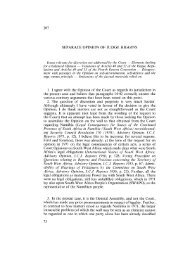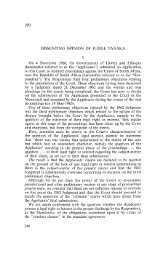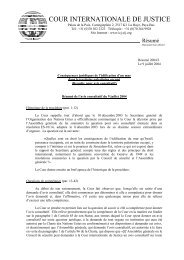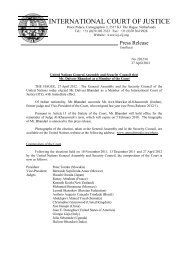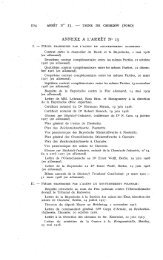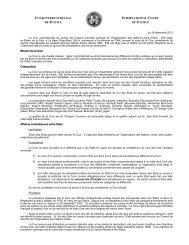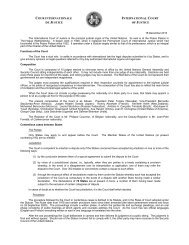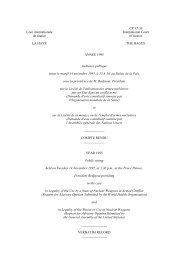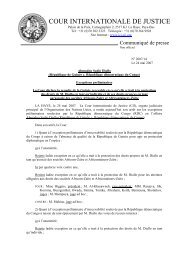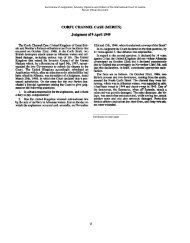botswana/namibia - Cour international de Justice
botswana/namibia - Cour international de Justice
botswana/namibia - Cour international de Justice
Create successful ePaper yourself
Turn your PDF publications into a flip-book with our unique Google optimized e-Paper software.
Secondly: the Namibian Government relies upon a scientific criterion for the <strong>de</strong>termination of<br />
the main channel which is eccentric in the extreme and which, more significantly, could not<br />
have been present to the minds of the statesmen concerned in the negotiation of the 1890<br />
Agreement.<br />
Thirdly: the Namibian Government offers the <strong>Cour</strong>t a theory which would seriously ero<strong>de</strong> the<br />
function of the 1890 Agreement in constituting a boundary and which provi<strong>de</strong>s the basis for<br />
submissions which are incompatible with the Special Agreement.<br />
(ii) The Major Emphasis is upon Title by Prescription<br />
134. The Memorial of Namibia <strong>de</strong>votes less than five pages to the actual text of the<br />
Agreement of 1890 (pp.45-9). The major proportion of the pleading is <strong>de</strong>voted to the<br />
<strong>de</strong>velopment of a case based upon prescription (pp.59-139). The relevant section of the<br />
Namibian Memorial, Part Two, is entitled: 'The Subsequent Conduct of the Parties to the<br />
Anglo-German Treaty of 1890 and Their Successors in Title with Relation to Kasikili Island'<br />
(p.59). However, this heading does not reflect the real substance of the argument pursued in<br />
Part Two of the Namibian Memorial.<br />
135. The text is in fact entirely frank about the direction to be taken. Thus the introduction to<br />
Chapter 1 of Part Two sets the tone:<br />
"The subsequent conduct of the parties to the Treaty set forth below is relevant to the present<br />
controversy in three distinct ways. In the first place, it corroborates the interpretation of the<br />
Treaty <strong>de</strong>veloped in Part One. Second, it gives rise to a second and entirely in<strong>de</strong>pen<strong>de</strong>nt basis<br />
for Namibia's claim un<strong>de</strong>r the doctrines concerning acquisition of territory by prescription,<br />
acquiescence and recognition. Finally, the conduct of the parties shows that Namibia was in<br />
possession of the Island at the time of termination of colonial rule, a fact that is pertinent to<br />
the application of the principle of uti possi<strong>de</strong>tis". (emphasis supplied). (Memorial, p.60, para.<br />
165).<br />
136. The introduction to the second section of this chapter is no less emphatic:<br />
"The conduct of the parties for the century after 1890 establishes that Namibia is entitled to<br />
sovereignty over Kasikili Island by operation of the doctrines of prescription, acquiescence<br />
and recognition, entirely in<strong>de</strong>pen<strong>de</strong>ntly of its treaty-based claim. Although much scholarly<br />
analysis has gone into <strong>de</strong>veloping distinctions between these three sets of doctrines, the<br />
fundamental elements relevant to all three are the facts that will be established in the<br />
succeeding chapters of this Part of the Memorial: (1) continuous, open and notorious<br />
occupation and use of the territory in question over a long period of time; (2) exercise of<br />
sovereignty in the territory; and (3) failure of the other party, having knowledge of these facts,<br />
to object, protest or assert its rights." (emphasis supplied). (Memorial, p.66, para. 180).<br />
137. The opening passages of Chapter IV of the Memorial provi<strong>de</strong> further illumination:<br />
"251. As noted in Chapter I of this Part, acquiescence is an essential element - some would<br />
say the essential element - in the acquisition of prescriptive title. As Johnson says, 'the<br />
essence of prescription is the acquiescence, express or implied, of the one state in the adverse<br />
possession of the other.' In<strong>de</strong>ed, Brownlie seems to conclu<strong>de</strong> that all of the other requirements<br />
are subsumed un<strong>de</strong>r that of acquiescence.



